Intersectionality and Mental Health
The term “intersectionality” was first coined by Kimberlé Crenshaw in 1989. Intersectionality encompasses the idea that we have more than one identity with a combination of various identity markers such as gender, race, religion, sexuality, etc. These identity markers intersect with one another and shape our experience. This pertains to mental health because our mental health oftentimes does not exist separately from identity markers. Mental health can be impacted by gender, sexuality, age, religion, and more. There may be unique life stressors that accompany these identity markers. An example of this is that a queer individual may have unique stressors related to their sexual identity that heterosexual people may not experience. When having conversations about mental health, including a wide range of narratives on inequality, discrimination, erasure, and violence that marginalized individuals experience are important because they impact mental health outcomes. However, it is important to understand that our individual identities are not the issue, the problem lies within power systems that cause discrimination and oppression. These power systems can impact mental health outcomes. This stresses the importance of community efforts to fight power systems and advocate for more equitable systems.

